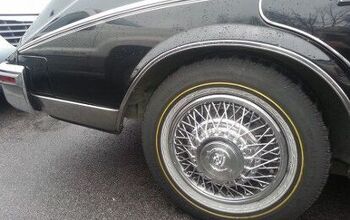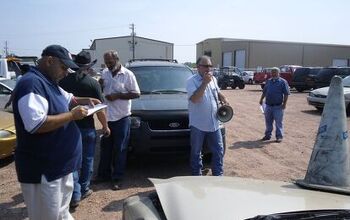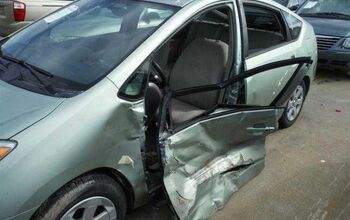Hammer Time: Keys
$2, $20, $200. $2000. Which one of the four would you like to pay? I always liked to opt for that simple $2 key. A crafted piece of metal cut to fit another crafted piece of metal. Turn the key for 20 years and enjoy a simple solution. But not everyone thinks that way.
Certain manufacturers like to put little chips in their keys to prevent theft. GM has been a long time practitioner of this art. Ford began in earnest around 1998. How do I know about Fords? It’s an absolute pain to get chip keys for a Taurus these days. You have to bring the vehicle to the dealer and have them program it. If it’s older than a 2000 you’re doubly screwed. Ford’s key database is kaput for vehicles before Y2K, which means you better have a first name relationship with a local locksmith.
Toyota used to be the kings of simple… before they created Lexus. Then a lot of the cost DNA started to go into regular Toyota products. The $2 key that I used for my 1994 Toyota Camry is peanuts compared with the $100+ key/fob for my mom’s 2003 Toyota Camry. Yet that’s child’s play compared with the $700 key/fob combination for a 2005 Lexus LS430.
What’s the difference? Nothing except a couple of vague piece of anti-theft technology and a few clickers. I have yet to see any cost benefit study that justifies the dealer prices for a chip key and fob. Between losing a loyal customer and replacing cheap metal, silicon and plastic for a 60,000% profit, which one’s worth more?
The key is of course! Then there are the uber-keys. You lose a key to a Saab and you better be praying to St. Anthony, Patron Saint of Lost Things. Check out the discount prices for a pair of Saab keys. Most Saabs on the road now aren’t worth that much.
Bad Swedes have bad keys. Volvo keys of recent vintage also tend to be a bit on the pricier side. Most Volvo dealers will charge about $300 for two ounces worth of dealer serviced metal and plastic. Not bad at all for late model vehicles. Especially compared to the Saab. But keep in mind you can also buy about 3000 pounds worth of a scrapped Volvo 240 or 850at an impound sale for the same price… with a key.
One of my family members, more than likely the dog, misplaced the keys to a Mercedes S500 a year ago. I ended up in hock to Mercedes for $200 thanks to that cosmic screw up. Every six months or so I have to deal with this headache called lost keys. The $10 for an old Toyota or Chrysler doesn’t bother me at all. $100 for a Ford or Buick chip key bothers me a bit. Anything more and I’m ready to pray, and surprisingly it works most of the time. Just not for a Mercedes.
More by Steven Lang
Latest Car Reviews
Read moreLatest Product Reviews
Read moreRecent Comments
- Dale Quelle surprise.
- 3SpeedAutomatic Nice looking, but IIRC, there was an issue with these engines where a knock would develop. That may account for the very low milage. 🚗🚗🚗
- Redapple2 Used to watch F 1 a great deal. Now? F1 Random thoughts:1 Silly rules bug me. Must use 2 types of tire. Cant refuel. Drag reduction can only be used in certain areas of the track and only if you are so close to the car in front.2 Passing is rare. Pole sitter wins a high % of the time.3 A new team can only start in F1 if they get the blessing of the overlords. Evil gm Vampire was barred. How about this. Anybody with a car that meets the construction rules can try. If your speed qualifies and you pay the entry fee. You re in. So is anybody else. 4 I tune in for Martin Brundle's grid walk. In my life, it s must see tv. But he is often bumped or cancelled. Grid walk takes place 1 out of 3 or 4 races.5 So, because of this utter bull sheet and other points, I ve migrated to IMSA and MotoGP. I might catch a summary on the youtube.
- Redapple2 I retract my comments and apologize.
- Flashindapan I always thought these look nice. I was working at a Land Rover dealership at the time the LR3 came out and we were all impressed how much better it was then the Discovery in just about every measurable way.


































Comments
Join the conversation
jimal the vw dealer(or audi) doesnt have a special machine to cut keys. Every VIN has one of 8 parts numbers for a key. There are 8 mass produced cutou A6 key isn't near $500 even with programming. If you need just the blade they are 80 plus prgramming if you need a whole key its like 170 plus programming.
See this http://www.newscientist.com/article/mg20827894.500-criminals-find-the-key-to-car-immobilisers.html the header reads Criminals find the key to car immobilisers 06 December 2010 by Duncan Graham-Rowe Magazine issue 2789. Subscribe and save For similar stories, visit the Crime and Forensics Topic Guide For 16 years, car immobilisers have kept car thieves at bay – but that may now be changing AFTER a 16-year decline, car theft in Germany rose in 2009, according to figures released recently by the German Insurance Association. One "white hat" hacker, who probes security systems to flag up flaws that can then be patched, thinks he knows why. Karsten Nohl of Security Research Labs in Berlin, Germany, has identified vulnerabilities in the engine immobilisers used to protect modern cars from theft.